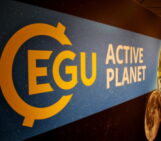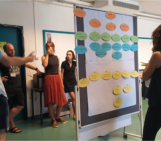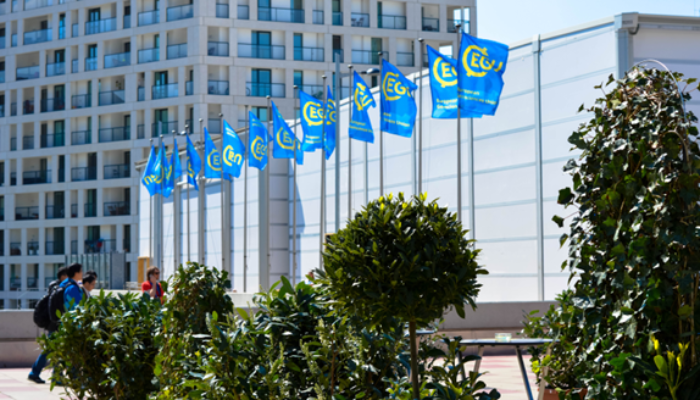
The European Geoscience Union (EGU) General Assembly (GA) is a precious occasion to create new connections and receive new stimuli to feed your own research, specifically for those in the early stages of their career. Nevertheless, the occasions for networking and scientific discussion can be so many, that it could be difficult to choose what to attend.
As a junior researcher and early career scientist (ECS) in the natural hazard division (NH) of EGU, I personally experienced that joining the EGU GA in person or at home can be overwhelming, making our heads spin around with so many interesting things we can do that goes beyond the disciplinary sessions. My advice to you? Schedule your GA programme at least one week in advance (using the online tool provided by EGU), and choose wisely. There’s plenty of time to do everything!
On this blog post, I will leave some suggestions that can guide you in the selection of the sessions and activities to attend during #EGU23, specifically if you are an ECS working in the Natural Hazards domain. Here is my bucket list of the activities you cannot miss in your agenda.
1. Do networking
Well, one of the main advantages of attending the GA, specifically in person, is to increase your network, meeting other ECS, or chatting informally with senior scientists. You will find numerous opportunities to meet and interact, official or unofficial, over a slice of Sacher torte or with a glass of beer.
Among the official on-site events, we can mention the Opening Reception, convened by the outgoing President Helen Glaves on Sunday, 23 Apr, 18:30–21:00 (CEST), Foyer F, and the ECS Networking and Careers Reception (on-site only), on Tuesday, 25 Apr, 19:00–20:30 (CET) Rooftop foyer. This last event brings together ECS, senior researchers, those in other science-related careers, in and out of academia, representing a fruitful opportunity to build connections. Please, remember that places at the reception are limited and, you need to register in advance! Further details about this event and other networking events for ECS can be found here.
In addition to the Union-wide events, do not miss the Natural Hazards Division specific networking Events. On 25 Apr, 12:45-13:00 CEST, G Terrace, we will organize a NH ECS Informal Lunch. Grab your food and drink, and join us. We will chat, share our ideas and have fun together. Hope to see many of you there!
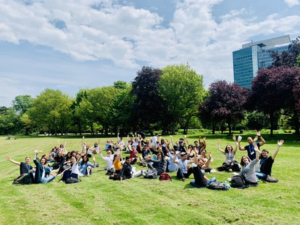
ECS informal networking event during EGU General Assembly 2022. Credit: Silvia De Angeli.
As a final suggestion, please remember that you can also organise and schedule your own ‘Pop-up networking events’, just filling in the form available here.
2. Attend the disciplinary sessions
The disciplinary sessions, also known as scientific sessions, are the core part of the GA, where you can share your latest results, and listen to the most recent advances in your research field.
These types of sessions include both: oral and poster sessions. Yes! The novelty of this year is that poster sessions are back! You can walk around in the Hall’s rooms, visit the posters, meet the people and continue to do networking. In addition, many of our ECS colleagues from the NH Division are involved as conveners or co-conveners in many sessions, and we see this number growing each year. For example, you can find me in the NH 7.1 session: “Spatial and temporal patterns of wildfires: models, theory, and reality”, where we will discuss how to improve the understanding of the wildfire regime and new strategies to mitigate the disastrous effects of wildfires. Or you can join Silvia De Angeli in the NH 10.1 session “Multi-hazards: Innovative approaches to risk assessments, disaster risk reduction, and climate change adaptation”, where you will have the opportunity to discuss a diverse range of multi-hazard risk and impact approaches.
3. Be inspired by medal & Award Lectures
Every year, the NH awards outstanding researchers within the field of natural hazards, and each winner has the opportunity to be a lecturer in the next EGU. This year is no exception, and if you want to be inspired, I would highlight the NH Division Outstanding ECS Award Lecture by Ankit Agarwal, which will be held on Monday, April 24, 14:00-14:30 (CEST) in Room M2.
Moreover, on Tuesday, April 25, 10:50-11:20 (CEST), Alberto Viglione, awarded by the Plinius Medal, will do the lecture “Extremes in river flood hydrology: making Black Swans grey” in Room C, while the Sergey Soloviev Medal Lecture by Peng Cui on mountain torrent and debris flow early warning will happen in the same room on Thursday, April 27, 14:00-14:30 (CEST).
4. Participate in the Division Meeting
Each EGU assembly division’s meetings usually occur at lunch time. This year is no exception, and our NH Division Business Meeting will occur on April 27 between 12:45 and 13:45 (CEST) in Room F2. This will be an opportunity to be aware of what is going on within the NH Division and actively contribute to decisions by expressing your vote.
5. Be involved in Short Courses, Union Symposia and Great Debates
#EGU23 offers other tools and occasions beyond the scientific sessions, that can help you in developing your career, searching for research funding, or successfully finding a good Life-Work-balance, mainly in the form of a Short Course.
To learn more about what Life-Work balance is and its importance for your wellbeing, you can attend the SC2.6: Mind your head: Life-Work-Balance – What does it mean?.
As an ECS, we sometimes find ourselves nervous about public speaking and never knowing what to say or how to act. This year, SC3.4 and SC3.5 are in your way to overcome these problems. Another interesting and relevant session for ECS is SC2.1: “European Research Council (ERC) Funding Opportunities in Geosciences”, where you will have the opportunity to know more about funding opportunities. While if you want to become a pro in science outreach, have a look at SC3.3: “Outreach: how to get your science out there?”.
There are plenty of other interesting Short Courses; please check the full list in the official programme and find the ones more useful to improve your skills.
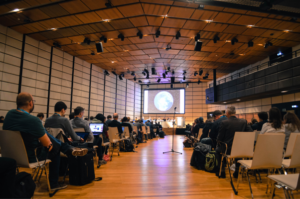
EGU17 – Arctic Great Debate. Credit: Kai Boggild (distributed via imaggeo.egu.eu)
Other interesting and engaging sessions is the Union Symposia and Great Debates, where experts in the field discuss the hot and relevant topics. Among others, I report the Symposium US1: Managing compounding impacts from extreme events through societal crises, on Wednesday, April 26, 10:45–12:30 (CEST) in Room E1, and the Great Debate GDB5: Is social media outreach?, convened by ECS, on Monday, April 24, 14:00–15:45 (CEST), in Room E1 to be really enriching.
6. Knowing more about ECS activities
This year ECS will have a dedicated corner at the EGU booth, in the Exhibition Hall X2, Purple Level –2 (basement). Go to visit them. You will meet one of the ECS Representatives, maybe Silvia De Angeli, our NH Division ECS Rep, and you will discover more about ECS activities inside the European Geoscience Union (not only during the General Assembly!). As an example, do you know that ECS are involved in Working Groups on several topics, including Life-Work Balance and Career Development, and that you can easily join them? Go to the ECS corner to discover more!
7. Touch data “by hand”
As a researcher, especially in the natural hazard field, you have to deal with data management, which can be demanding. This year, you have the opportunity to access the Virtual Data Help Desk during all EGU week, where you can ask data questions and watch tool demos and tutorials personally. For more information, please access: https://blogs.egu.eu/geolog/2023/04/05/how-to-egu23-the-data-help-desk/.
Splinter meetings are also another way to meet data products that might be in your interest. For example, during the SPM8, you will have the opportunity to meet and discuss the new burnt area dataset of ESA.
8. Take some rest
Off the all recommendations, taking care of ourselves is an important one, so do not exaggerate in filling your agenda while leaving some free slots to relax, explore some outdoor activities, sightseeing around the city, or just resting. Being in a different country, city or even meeting different people for 5 days at the conference are quite long and demanding for our mind and body. Here you can find some smart tips to better balance your time during the conference week.
Post edited by Silvia De Angeli and Shreya Arora

